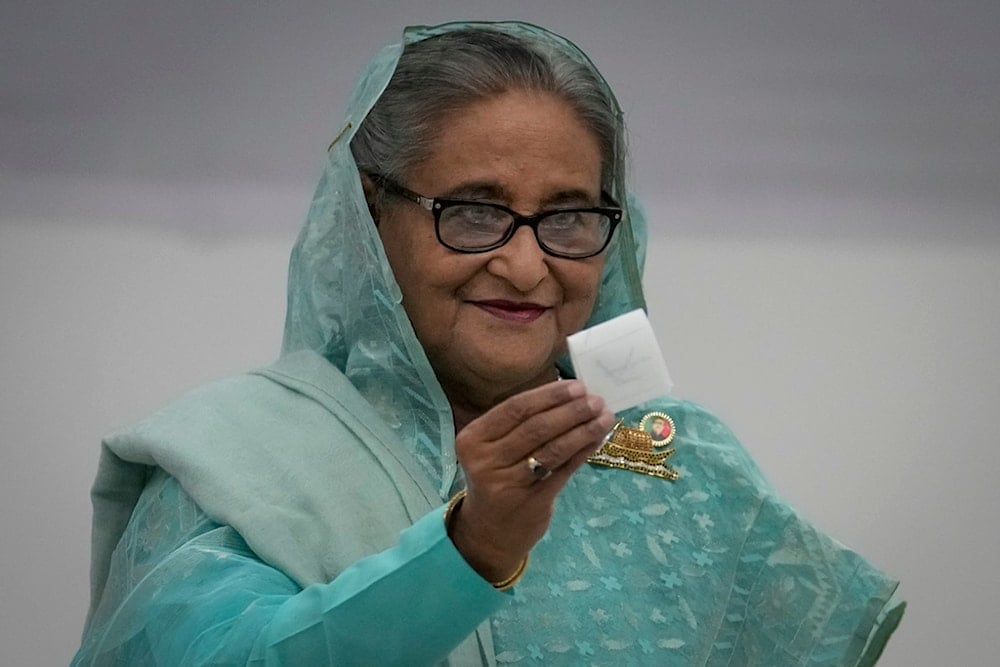Ousted Bangladesh PM says upcoming elections risk deepening divide
Bangladesh's fugitive former PM Sheikh Hasina warns Bangladesh’s upcoming elections are illegitimate without the Awami League, slamming her trial as politically driven.
-

Bangladesh's then-Prime Minister Sheikh Hasina shows her ballot paper as she casts her vote in Dhaka, Bangladesh, Sunday, January 7, 2024. (AP Photo/Altaf Qadri)
Former Prime Minister of Bangladesh, Sheikh Hasina, has warned that the nation's upcoming elections will deepen the country's political crisis if the banned Awami League is excluded, stating in her first comments to the media since her ouster, that the interim government's moves are undemocratic and labelled her ongoing trial for crimes against humanity a “jurisprudential joke”.
In written responses to AFP, Hasina, who has been in hiding in India since her government was toppled in August 2024, spoke out against the leadership of interim Prime Minister Muhammad Yunus, whose administration banned the Awami League in May.
“Elections without the direct participation of all major parties, including the Awami League, cannot be credible,” she told the news outlet. “Yunus must reinstate the Awami League to give Bangladeshis the choice they deserve.”
The 78-year-old former premier fled the capital by helicopter as student-led protests overwhelmed her security forces. The United Nations estimates that up to 1,400 people were killed during the crackdown.
Read more: Banned Bangladesh party turns to flash protests ahead of polls
Awami League ban sparks election legitimacy fears
Hasina’s comments to AFP come as Bangladesh prepares for general elections scheduled for February 2026. She warned that holding elections without her party would “sow the seeds of future division.”
The Awami League, which ruled for 15 consecutive years before being overthrown, was banned under amended anti-terrorism laws.
“Elections are a competition of ideas,” Hasina said to AFP. “You cannot ostracise a party because you don't like their policies.”
Hasina has continued to address her supporters through social media, but her comments to AFP mark her first formal remarks since her departure from office.
Read more: Former Bangladesh prosecutor arrested for attempted murder
Hasina slams trial as politically motivated
Hasina is currently being tried in absentia on charges of crimes against humanity, including responsibility for the deaths during the 2024 crackdown.
Bangladesh's Chief Prosecutor Tajul Islam accused her of being “the nucleus around whom all the crimes were committed,” and has called for the death penalty.
Hasina has refused to return to attend the trial, calling it politically driven. “The charges themselves are rejected in full and are not supported by any evidence,” she said. “It has been appointed by an unelected administration consisting of my political opponents.” A verdict for her trial is expected on November 13.
Read more: Bangladesh to hold all-party talks to foster stability
Rising support for BNP and Jamaat-e-Islami
With the Awami League banned, political momentum appears to be shifting toward the Bangladesh Nationalist Party (BNP), now seen as the leading opposition force. Jamaat-e-Islami, the country’s largest Islamist party, is also gaining support.
Hasina warned that excluding her party from the democratic process would only embolden political extremism and fracture national unity.
The prosecution has presented audio recordings, verified by police, suggesting Hasina directly ordered lethal force against protesters. Hasina denied the allegation, calling the recordings “taken out of context.”
She criticized the court proceedings and insisted that she would only recognize the legitimacy of an international legal body such as the International Criminal Court (ICC). “The charge that I personally directed security forces to open fire on crowds is bogus,” she said, though she admitted some mistakes may have been made “within the chain of command."
Crackdown and retaliatory violence post-uprising
Since her removal, the interim government has launched a sweeping crackdown on her political allies. In February, security forces initiated “Operation Devil Hunt,” arresting thousands accused of plotting to destabilize the country.
Hasina gave no comment on the fate of hundreds reported to have disappeared into secret detention facilities during her administration.
Earlier this month, lawyers representing the Awami League urged the ICC to investigate alleged retaliatory violence, including beatings and lynchings of their supporters, which they argue will not be prosecuted domestically.
When Hasina was asked whether she intends to return to politics, she remained vague, stating, “My priority is the welfare and stability of Bangladesh.”
Read more: Bangladesh tries top officers for disappearances after 2024 protests

 4 Min Read
4 Min Read










